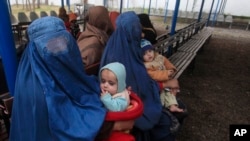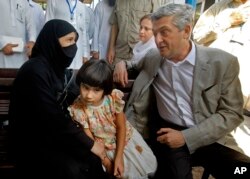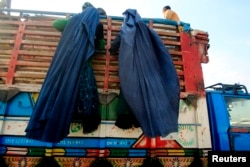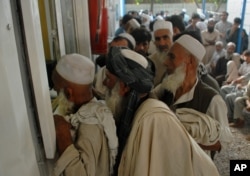An international rights defender has accused Pakistan and the United Nations refugee agency of complicity in promoting “unlawful and coerced” repatriation of tens of thousands of Afghan refugees.
In a report released Monday, Human Rights Watch alleges that in response to deadly security incidents and deteriorating political relations with Afghanistan over the past two years, Pakistani authorities have mounted a concerted campaign to drive Afghans out of Pakistan.
“In the second half of 2016, a toxic combination of deportation threats and police abuses pushed out nearly 365,000 of the country’s 1.5 million registered Afghan refugees, as well as just over 200,000 of the country’s estimated one million undocumented Afghans,” the report noted.
HRW senior researcher Patricia Gossman, while sharing details of the report at a news conference in Kabul, said the exodus amounts to the world’s largest unlawful mass forced return of refugees in recent times.
“The way Pakistan carried that out was through a range [of] abuses toward the refugee[s] and the undocumented Afghans in Pakistan. And this included, detentions, extortion, extracting bribes, the closure of Afghan schools, raids on people's homes and other threats, including from the local population that Afghans we[re] no longer welcome.”
Pakistan denies coercion
Pakistani authorities maintain that areas where Afghan refugees reside have lately become security challenges and safe havens for anti-state militants, and after hosting them for four decades, host communities also want the refugees to be relocated. But Islamabad denies allegations of any concerted campaign of abuse and coercion.
Gossman warned that the refugee families pushed out of Pakistan are returning to expanding armed conflict in Afghanistan where they also face widespread destitution and a near-total absence of social services.
The report harshly criticized the U.N. Refugee Agency, or UNHCR, for allegedly facilitating repatriation of refugees from Pakistan, saying the agency was actually complicit in this forced return of displaced families.
“Rather than saying something, speak out publicly when this concerted campaign by Pakistan began, UNHCR in Pakistan remained silent and in fact increased its cash grant to the refugees all of which facilitated the return of hundreds of thousands of people in conditions that cannot be called voluntary."
UNHCR promptly responded to the allegations, saying it disagrees with the conclusions of the HRW report. In a statement sent to VOA, the agency said that throughout 2016, it has informed Afghans of their rights, intervened in cases of unlawful arrest and detention, and intervened in nearly 6,000 cases of arrest, securing the release of almost all.
“UNHCR does not promote returns to Afghanistan given the enduring conflict in different parts of the country and its limited absorption capacity. At the same time, the agency does help those who decide to return based on the options available to them,” the agency said in the statement.
Complex situation
It maintained that the multiple drivers behind the surge in the returnees are complex and influenced by shifting regional dynamics and relations between Pakistan and Afghanistan.
“They include pressures by authorities amidst broader security operations, changing attitudes among host communities, uncertainty about the renewal of refugee ID cards, economic hardship, stricter border controls disrupting trade and family ties. There was also a campaign by the Afghan government in Pakistan to encourage Afghans to return home.”
Speaking in Kabul, Gossman also slammed Afghan authorities for encouraging the refugees to return when the conflict has worsened and the government is unable to deliver on its resettlement incentives.
“It is very reckless and irresponsible at the very least to promise land or other advantages to people who return when that is actually not forthcoming.”














